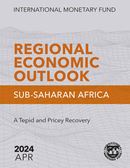This web page provides information on the activities of the Office, views of the IMF staff, and the relations between Ethiopia and the IMF. Additional information can be found on the Ethiopia and IMF country page, including official IMF reports and Executive Board documents in English that deal with Ethiopia.
At a Glance
- Current IMF membership: 190 countries
- Ethiopia joined the Fund in December 27, 1945
- Total Quotas: SDR 300.70 Million
- The Federal Democratic Republic of Ethiopia: Staff Report for the 2018 Article IV Consultation, December 4, 2018, Series: Country Report No. 18/354
Office Activities
-
Contextualizing Ethiopia’s Recent Economic Performance
Keynote Address by Abebe Aemro Selassie, Director, African Department, IMF at the Ethiopian Economics Association’s 17th International Conference on the Ethiopian Economy.
July 18, 2019
-
G20 Compact with Africa Peer Learning Workshop on Private Sector-Led Diversification and Growth
Remarks by Abebe Aemro Selassie, Director, African Department, IMF Addis Ababa, Ethiopia
July 17, 2019
-
Regional Economic Outlook for Sub-Saharan Africa and Macroeconomic Issues for Ethiopia
Presentation by the IMF Resident Representative to development partners and private sector representatives
November 1, 2013
IMF's Work on Ethiopia
-
July 29, 2024
The IMF Board approved an SDR 2.556 billion (about US$3.4 billion) ECF arrangement for Ethiopia. This decision will enable an immediate disbursement equivalent to SDR 766.75 million (about US$1 billion).
-
July 29, 2024
Series:Country Report No. 2024/253
-
IMF Executive Board Concludes 2024 Article IV Consultation with Djibouti
June 4, 2024
Washington, DC – June 4, 2024: The Executive Board of the International Monetary Fund (IMF) concluded the Article IV consultation with Djibouti on March 22, 2024.
-
Transcript of IMF Press Briefing
May 16, 2024
Good morning, everyone, both to those of us here in person and also those joining us online. Welcome to this IMF Press Briefing. I am Julie Kozack, Director of Communications at the IMF. As usual, this briefing is embargoed until 11:00 a.m. Eastern Time in the U.S. I will start with some announcements and then we'll move to your questions in person, on Webex, or through the Press Center.
-
Transcript of African Department April 2024 Press Briefing
April 19, 2024
Good morning and good afternoon and good evening for our viewers around the world. I am Tatiana Mossot with the IMF Communication department.
Regional Economic Outlook
April 19, 2024

After four turbulent years, the outlook for sub-Saharan Africa is gradually improving. Growth will rise from 3.4 percent in 2023 to 3.8 percent in 2024, with nearly two thirds of countries anticipating higher growth. Economic recovery is expected to continue beyond this year, with growth projections reaching 4.0 percent in 2025. Additionally, inflation has almost halved, public debt ratios have broadly stabilized, and several countries have recently issued Eurobonds, ending a two-year hiatus from international markets. However, not all is favorable and risks to the outlook remain tilted to the downside. The funding squeeze persists as the region’s governments continue to grapple with financing shortages, high borrowing costs, and impending debt repayments. Amid the challenges, sub-Saharan African countries will need additional support from the international community to develop a more inclusive, sustainable, and prosperous future.
Read the Report
Departmental Papers on Africa




